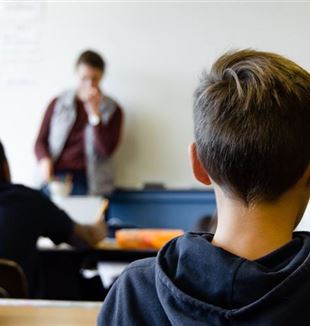
School learns to educate again
The health emergency has closed schools, but has not stopped classes. In a meeting organized by the Milan Cultural Centre, teachers and principals talk about the surprises, and the problems, of recent weeks.One million, seven hundred thousand teachers and school staff, eight and a half million students, 17 million parents. Almost one in every two Italians is affected by the school closures due to the health emergency. But we now understand clearly that the lives of students and teachers have not stopped. And the term "distance learning" has now become part of the quarantine routine. There have been so many problems. Particularly at first. There were those who moved immediately, those who took longer to understand how to do it. There are still many questions about the future. About the near future, and about what will happen after the summer.
It is too early to draw conclusions, but it is right to start thinking and looking at what is happening. This is what the Milan Cultural Centre wanted to do by proposing a round-table discussion between teachers and centre directors, entitled: "The education you did not expect. The school that there is - Discoveries and expectations in time of Coronavirus." The online meeting, moderated by Andrea Caspani, was attended by Eraldo Affinati, writer and teacher, founder of Penny Wirton; Ezio Delfino, national president of Disal (Association of Independent and Free School Directors); Ludovico Arte, director of the Marco Polo Technical Institute in Florence; Gilda Esposito, director of the "Eduardo De Filippo" Santa Maria La Carità teaching circle in Naples, and Paola Fantolini, teacher at the Sacro Cuore Foundation in Milan.
"The response to the emergency was immediate almost everywhere,” noted Delfino: "The first need was to understand that, before organizational and bureaucratic aspects, there is a prerequisite for schooling, which is the children’s need to be educated. The other thing is a new awareness that the role of the educator is total and personal, generated by the movement of freedom." For the president of Disal, this was the real novelty that has happened in recent weeks: "A free mobilization, which does not start from a pre-established model or a stable order. Proof of this lies in the fact that the indications of the Ministry of Education came after the individual institutes had already, in some way, resumed to function.” In these days, explains Delfino, we have discovered that autonomy is a resource, and that the new modalities and organizational dynamics of distance learning can be useful and used in the future.
Affinati, whose Penny Wirton schools teach Italian to immigrants in various Italian cities, says that his school has also started to offer distance learning courses. "We are in a situation of fragility. We are all wounded. We know that this is not true education," says the writer. "Education is about looking at each other in the eyes. It is the smile, the pat on the back. But it is precisely because that is what we are missing now. If we come to realize this, we will have made the most of the crisis we are going through." But Affinati also points out another aspect: "The situation is also highlighting that many people do not have access to the internet and cannot make use of this different mode of schooling. And this is serious and is the thing that worries us most." Then there is a difference, explains the writer, between teenagers who are experimenting with these new solutions for learning, "an avant-garde generation", and young children who suffer the most, because they need more hands-on activities and need to move around more.
Ludovico Arte, for his part, observes that at first there was a strong sense of disorientation. The educational system lacked a reference point, particularly bureaucratic ones: the attendance register? Class program? Grades? "The first thing we had to do was to do away with these concerns, and realize that the parameters of normality were no longer valid. We had to appeal to everyone's responsibility: to do what can be done under the given conditions." It was not only an educational move, but a human and social one as well: "There are teachers who are experiencing this with great passion and the children are aware of it. Some students have noticed that some teachers start the lesson by asking how they are doing. It's a "small" question, but it is a concern that, normally, evades us." It is paradoxical, he observes: "A greater human closeness is being created within the distance.”
For Gilda Esposito, the Italian school system has rediscovered that it is better than we thought. "I have not perceived that same intolerance we often have because of that additional meeting, the extra half hour of work... Teachers and administrative staff never seem to get tired these days. Seeing this gives me a lot of confidence, especially if we do not drop this attitude." She also observes that the alliance between school and family, which she has written and spoken much about, can be experienced and is a true resource. Particularly in the most difficult situations: "There are families that have big organizational problems. Many parents work all day and leave their young children with grandparents who do not know how to use technology. Then there are disabled students, for whom, in this situation, we can do nothing but give human support to them and their family."
Many of Professor Fantolini’s students, from the Sacro Cuore Foundation, are physically touching the drama of the situation. Some have parents who are medics who work with coronavirus patients, others have grandparents who are seriously ill…"The experience of fragility makes young people’s questions clearer. And this forces us teachers to focus on the essential. Even from an existential point of view. We must offer something that is equal to the drama they are experiencing." She talks about a dialogue she had with some students who have to choose what to study at university next year. "What is happening, for some, has reopened their eyes. Now it is clearer that the challenge is to understand what our role in the world is. And so one thinks about that choice in a different way." The other aspect, explains Fantolini, is to offer a horizon of positivity, based on the certainty of a good destiny for everyone, within which one can live the drama, without being paralyzed by it.
Read also – At the wellspring
All this is not only true for education, but it is particularly pertinent to education: nobody knows when it will end and what the next months will be like; there are more questions than answers. But what has happened in recent weeks, both positive and negative, is a fact of experience which, in any case, we must not stop reckoning with.#Coronavirus